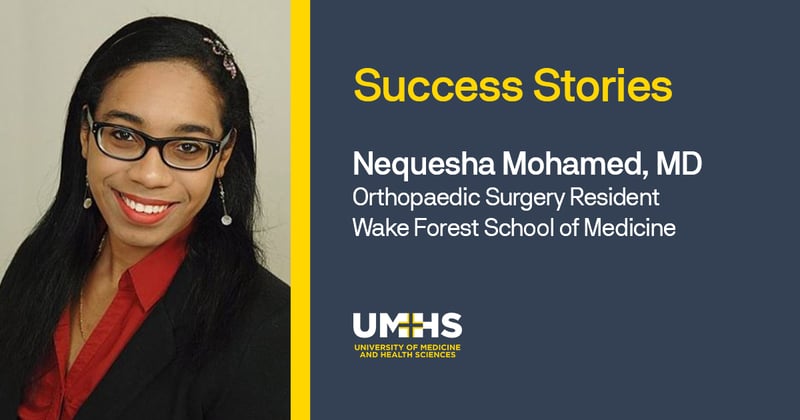Dr. Nequesha Mohamed is a true UMHS trailblazer. She’s the first UMHS student to Match in Orthopedic Surgery and she has also had a unique journey through medical school. A native of Canada, Dr. Mohamed starts an Orthopedic Surgery residency at Wake Forest Baptist in North Carolina this summer.
The UMHS Endeavour spoke to Dr. Mohamed about her upcoming Orthopedic Surgery residency, why she always wanted to be a doctor as well as her research and how she managed to Match after being out of med school for several years.
Ontario, Canada native
Dr. Mohamed grew up in Ajax, Ontario, just outside of Toronto, Canada.
"I went to school at the University of Toronto,” she said. “I did my undergraduate degree in neuroscience because I always knew that I wanted to be a doctor. I always wanted to be a surgeon specifically, and I was lucky enough to Match into Orthopedic Surgery this year.”
What is Orthopedic Surgery?
Orthopedic Surgery is a competitive specialty. What exactly does it involve?
“It's something that I didn't really know about until a few years ago. It's essentially surgery on the musculoskeletal system, mainly on the bones, but there can be some muscle or soft tissue coverage as well. But essentially you are taking care of patients who have fractures, patients who need joint replacements, or kids who aren't having their bones grow correctly. There's a wide variety of things that orthopedics can cover, but at the core of it, it's all about taking care of the bones.”
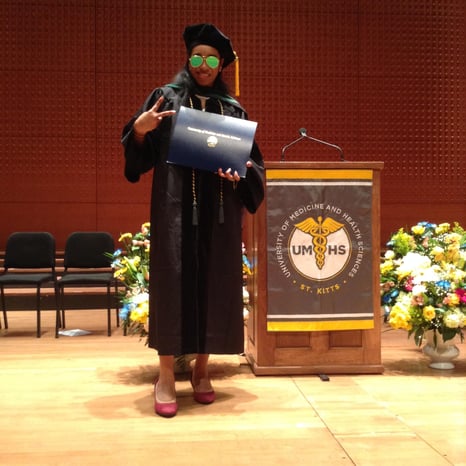 Dr. Mohamed at UMHS graduation in 2017. Photo courtesy of Dr. Mohamed.
Dr. Mohamed at UMHS graduation in 2017. Photo courtesy of Dr. Mohamed.
For Dr. Mohamed, finally obtaining her Orthopedic Surgery residency has been especially thrilling because she’s encountered bumps along the way.
“It's really been a long road. I mean, I technically graduated at the end of 2016. I have been pursuing Orthopedic Surgery since then, because like I said, I didn't know about this specialty for a long time. I did my General Surgery rotation in New York and managed to do a couple of ortho cases there. But even still, there's nobody that's matched in our school to Orthopedic Surgery.”
How research helped her obtain residency
Since she did not Match right away, Dr. Mohamed admits she had to be persistent and persevere.
“You kind of get in that mindset of, ‘Well, maybe this isn't something that I can get into.’ It's a very competitive field and IMGs are typically not accepted at a lot of programs. So, for me, it was disheartening because you want to follow your dreams, but it makes it so much more difficult when you don't see any paths in front of you. But I was lucky enough to do an Orthopedic Surgery research rotation. And I found myself a mentor there, Dr. Ronald Delanois, and he helped guide me through this whole process and we set up a plan, talked to a lot of people, and I was able to grow my network. I did a lot of research. I published many papers in the orthopedic field, and that ultimately led me to where I am now at Wake Forest in North Carolina, where they have a physician scientist track. This is a seven-year program essentially, where you do two years of PhD work and then you reapply to get into the residency program. I don't think that anyone really knows about this, and I certainly didn't think that I had a chance at getting into this field at all until I talked to the right people and was able to find the path that worked best for me, which was the one going to Wake Forest.”
Overcoming not Matching on first try
Not everyone Matches on the first try, and Dr. Mohamed’s story is unusual indeed.
“I applied for the Match. I tried to do General Surgery as my first choice because we obviously have some success there. And although I got interviews, I ultimately didn't Match there. And I think part of it was being an IMG. But part of it was also being a Canadian at the time, needing a visa to get into a lot of these programs, all of which held me back. And as hard as it was to go through that, I think it was the best thing that happened to me because that allowed me to pursue what I really wanted, which is Orthopedic Surgery. And it set me on this path that now I can sit here talking to you about being the first UMHS grad to get into ortho.”
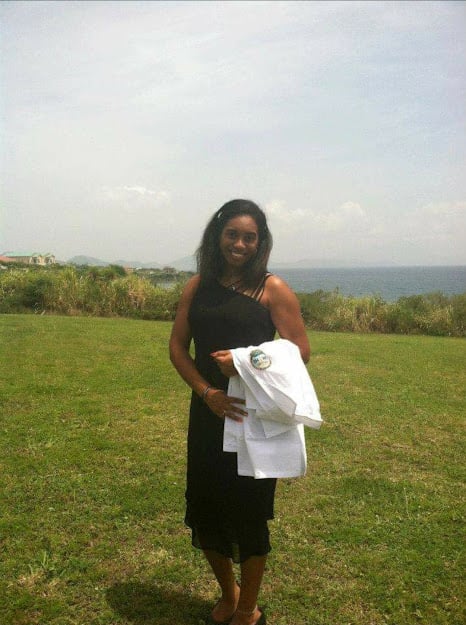 Dr. Mohamed at the White Coat Ceremony in St. Kitts. Photo courtesy of Dr. Mohamed.
Dr. Mohamed at the White Coat Ceremony in St. Kitts. Photo courtesy of Dr. Mohamed.
Why UMHS?
Why did Dr. Mohamed choose to study medicine abroad at UMHS over other schools?
“As some people will know, the Canadian medical system is very difficult to get into. There's only a handful of schools in each province. And while I did fairly well in my undergrad, I had a couple of struggles in a couple of classes. So, looking at options that were available to me, I knew that I had to be a doctor and I wasn't going to stop. And UMHS came up as one of those options to go to the Caribbean and do medical school. And out of the ones that I'd researched, I felt like UMHS put the most effort into trying to answer my questions and trying to make me feel comfortable going to another country to study medicine. So that was really what swayed me to choosing this school and saying, okay, they seem like they care about their students and they're going to set you up to be successful. So, I took the chance and ended up down in St. Kitts and here I am.”
Professors & staff that made a difference
There were numerous professors and staff members at UMHS that helped Dr. Mohamed along the way.
“There were a lot of great professors on the island. Many of them, it's funny thinking back that you could tell there was a difference in the way they taught and quite a few of them. Dr. Prakash Mungli was a great professor. There is Dr. Girish Kotwal, the late Dr. Michael Doherty, and Dr. Anoop Jalan. They were all really great at giving the foundations that you needed to succeed for Step One. Moving on to the other side of things, I found that there were a few key staff members. Associate Director of Academic & Student Affairs Jonathan Timen has been tremendously helpful even after leaving the school and graduating; he's the person that I always go to ask for any help with my transcripts. He's been wonderful in helping me with my postgraduate journey to get into residency.”
How UMHS helped her reach goals
One part of the UMHS journey was especially beneficial to Dr. Mohamed.
“I think one of the things that helped me to get to where I am now is the clinical rotation structure. I know that when I was going through it, we were sent all over the country. We didn't necessarily have a specific hub to go to, but I tried to finish as many as I could in one area. And that ended up being in Baltimore, Maryland. And the hospital that we were contracted with there had a ton of different rotations and being able to work directly with the coordinator there who was easily able to facilitate with the school, helped me to complete a lot of things there, but that also gave me the opportunity to do the research rotation that I did because I wouldn't have found out if the coordinator hadn't said, ‘Hey, you know, you need four more weeks to finish your education. There's this research rotation that's four weeks that can start at any time. And I've heard students do well, they publish when they go through there.’ So, being able to be flexible, but having those relationships that UMHS built was one of the things that allowed me to succeed.”
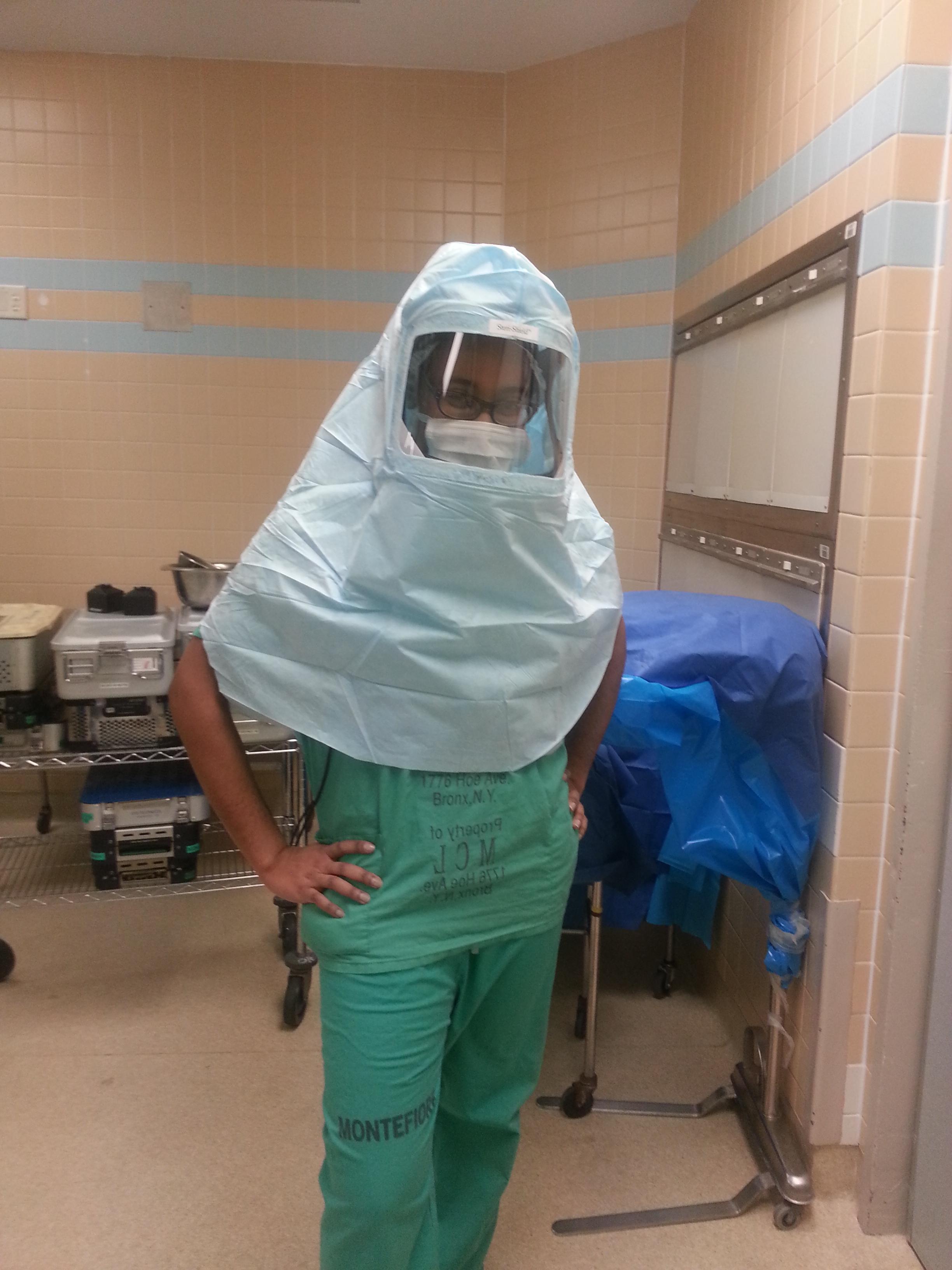 Dr. Mohamed scrubbing into her first THA during clinical rotations. Photo courtesy of Dr. Mohamed.
Dr. Mohamed scrubbing into her first THA during clinical rotations. Photo courtesy of Dr. Mohamed.
Orthopedic Surgery as a career
Several aspects of Orthopedic Surgery are of great interest to Dr. Mohamed.
“With orthopedics it is really the immediate impact that you can have on a patient's life,” she said. “Just being able to fix a broken bone and hearing from the attendings that I work with here, that these patients are so immediately grateful, that someone who was in a lot of pain is able to suddenly feel less pain. Somebody who's had joint mobility problems, as soon as we replace it, they're able to get up and start walking again so quickly. For me, that was a big reason why I got into medicine in the first place—I wanted to have that hands-on experience of impacting a patient's life and helping them for the better and as great as all the other specialties are, I knew for me, I had to be a surgeon because that is where I would have the most direct impact on improving lives.”
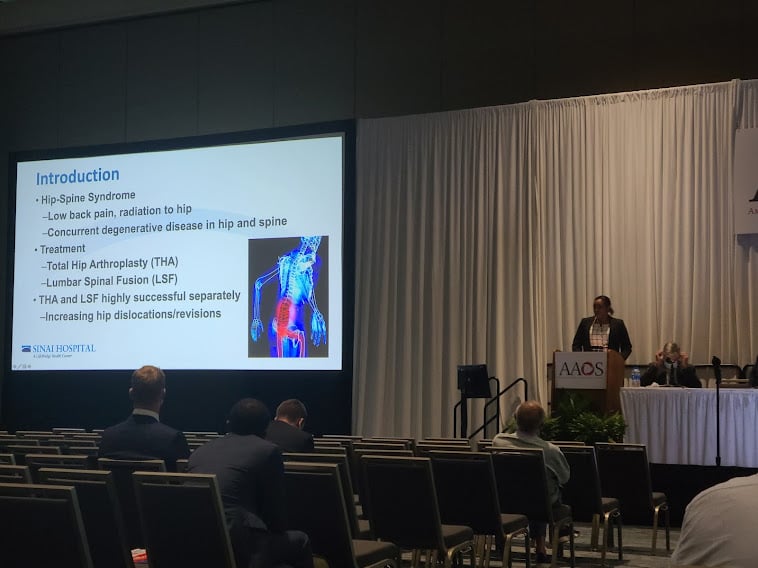 Dr. Mohamed presenting at AAOS in 2021. Photo courtesy of Dr. Mohamed.
Dr. Mohamed presenting at AAOS in 2021. Photo courtesy of Dr. Mohamed.
Advice for the Match
Dr. Mohamed said any UMHS student who has questions about the Match or is not successful on the first attempt should first contact Patrick McCormick and his staff in the Office of Academic & Student Affairs in New York City.
“It is very difficult once you haven't matched once. And going through that cycle several times can be disheartening. But the most important thing is to believe in yourself and to not stop trying. If you want something and you can see a path towards it, it's important to keep pushing forward. But even more than that, what I realized going through it was, it's not necessarily how good you are, it's also about who you know. If you're having a difficult time, you should early on try and find mentors or people in residency programs or different hospital systems that can be a sponsor for you. And I say, sponsor, not mentor because I've been learning about this, but mentors are people you can talk to and will give you advice. But a sponsor is somebody who will go to bat for you. Somebody who's going to pick up the phone and call and say, ‘Hey, I think this person's awesome.’ And I think that's something that a lot of students don't necessarily realize, especially trying to get into some of these more competitive fields. My advice is, if you can find your sponsor early on, then you will set yourself up to have the most success.”
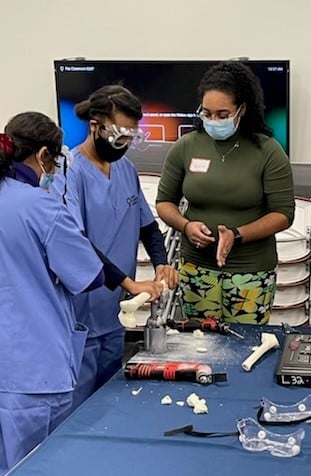 Goals for residency
Goals for residency
Dr. Mohamed has many goals for her upcoming Orthopedic Surgery residency.
(Inset, right): Teaching high school students at the Perry Initiative in 2022. Photo courtesy of Dr. Mohamed.
“Overall, I want to become the best surgeon that I can be. And that includes learning as much as I can, scoring well in the in-service training exams, but also doing the other side of things. I have a strong research background, so I'd like to continue doing research and developing my skills in that. I'd like to finish my PhD while I'm going through it because I've already started and I'm on my way and I should be able to graduate in the next couple of years, but making time for that is important. Also being able to develop myself, but also help mentor other people because it's not an easy journey and I wouldn't want anyone to have to go through what I had to go through to get to this spot, and using all the things that I've been able to do to make the path easier for somebody else.”
Lessons from the COVID-19 pandemic
The pandemic changed the public’s perception of doctors but the backlash against mask mandates and vaccines has been challenging, Dr. Mohamed said.
“In the beginning, yes, there was a lot more attention to doctors and the struggles that they were going through, but because this pandemic has dragged on for so long, it's also made it turn the corner. And so, you start seeing people going against doctors who are trying to say, get vaccinated, protect yourselves. But because it's been so long, people are like, you can't tell me what to do. And so, I think it's been interesting to see the change from how they were celebrated doctors as healthcare heroes, to now being controlling of some patients who don't want to go through with these protective measures.”
There have been many lessons for med students.
“I think it's good for prospective students to see both sides of that because you can be the best person in somebody's eyes, but then you do one bad thing and then all of a sudden, you're the bad guy and you have to be prepared for both situations because no matter what, at the end of the day, your job is to help take care of people. And this pandemic has shown us that as difficult as it can be, it's really you that has to make the sacrifice and you have to find your reasons to get through it. So, I think the public is going to change their opinions one way or the other, but we can kind of get a sense of how things change depending on what the current climate looks like.”
“ I was doing research for the most part of the pandemic, working on my PhD, doing my research fellowship. And one thing that I think a lot of us learned is that a lot of the work we do can be done remotely, which is not just productive, but it's safer for a lot of things. I think that in the terms of medicine, there is an avenue now where you can open up to telemedicine and you can do office visits or conduct some very primary things through video calls and it makes people more accessible. I think that's something that we need to take forward in the future is that we can accommodate people and make things accessible to them.”
Doctoral studies in molecular medicine & translational science
Since graduating from UMHS in 2016, Dr. Mohamed has been working on a PhD. in molecular medicine and translational science at Wake Forest as well as studying law.
“So, in biomedical sciences, but been doing that for the last couple of years, working on basic science experiments to basically understand more about osteoarthritis for my specific project, as it relates to my future career. But more than that, it's been great because I've also been able to obtain a masters in studies of law at the same time. So, I've been very busy trying to keep myself integrated in this field because where I see myself in the future is being a surgeon, but also trying to help others impacting the law and the policies that come to doctors, but also understanding how the patient side of things are affected with the basic science.”
Being a woman of color in Orthopedic Surgery
Dr. Mohamed said it’s exciting to be a woman of color entering Orthopedic Surgery at this time of great change in America.
“I think the main thing is that orthopedic surgery can seem like a daunting field. I know early on I had a couple friends say, ‘Oh, you have the personality to fit into orthopedics,’ but I never saw it myself because I've never seen anybody like myself there. And it can be a bit scary trying to break into a field. But I think we're at a time now where there are more people that are getting into this field that are very diverse. I mean, in my class there's going to be four women, which is the most that's in a program. And so, I think that it's trying to find those people that look like you and imagining yourself there, because if you can see it, then you can do it. And I know I had a problem with that in the beginning, but luckily, I was able to make that change to see myself in this position and ultimately end up here.”
Dr. Mohamed is open to questions from current and prospective students and can be reached via email at nmohamed@wakehealth.edu
YouTube interview with Dr. Nequesha Mohamed

Scott is Director of Digital Content & Alumni Communications Liaison at UMHS and editor of the UMHS Endeavour blog. When he's not writing about UMHS students, faculty, events, public health, alumni and UMHS research, he writes and edits Broadway theater reviews for a website he publishes in New York City, StageZine.com.













